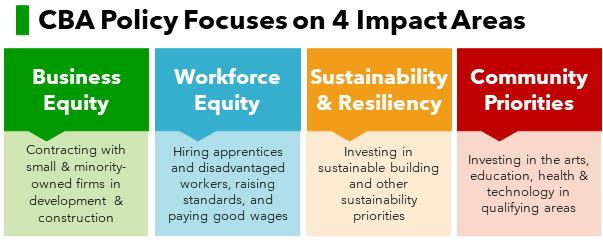– By Gypsy C. Gallardo, for One Community & CBA Policy Advocates
This Thursday, July 22nd, the St. Petersburg City Council is set to take its final vote on the Community Benefits Agreement (CBA) Policy that sparked small ripples of disagreement when the eight Councilmembers first discussed the topic in February. Since then, Councilmembers have met with CBA advocates and City staff a dozen or more times to hash through the specifics.
If it makes it through this Thursday’s Public Hearing, St. Petersburg will be the first city in Florida to have a standing, citywide CBA Policy. Other cities have similar programs (such as Miami’s Public Benefit Program), but – critically – they do not empower the community as a partner in negotiating benefits with developers, and they don’t link sustainability and equity as twin forces in our future.
Groups leading the CBA campaign are asking advocates to come out to the Public Hearing to support the cause (July 22nd, 5 PM at City Hall), and for those who can’t attend, to sign the online CBA Policy Petition.
Here is a quick rundown of the who, what, when, and why of this groundbreaking new policy.
Why the Push for a CBA Policy for St. Pete
Economically disadvantaged groups have reaped little benefit from the booming pace of real estate development in St. Petersburg, in downtown and other areas. Even development projects in South St. Petersburg (where 80% of the city’s Black residents live) have lacked the substantial involvement of community businesses and workers, and have yielded little by way of affordable, accessible spaces to live or work, or employment and business opportunities.
This is despite the fact that many of these multi-million-dollar projects receive significant City (taxpayer) support in the form of financial subsidies, incentives, tax exemptions, reduced land costs, etc.
The result is that diverse workers and entrepreneurs are often left on the economic sidelines (particularly African Americans), and much of the city is alienated from the development process.
CBA policies are used by local governments and advocates across the nation as a way for residents, entrepreneurs, and community organizations to “have a seat at the table” when decisions are made about large-scale “public-private” developments, and to reap and retain more of the economic benefits generated by development in their communities.
What the CBA Policy Will Do
If it passes, the new CBA Policy will ensure that diverse residents and entrepreneurs share more equitably in the economic benefits that result from development projects in St. Pete.
The policy will apply to all projects with a construction value of $2 million or more, that receive City support of at least 20% of cost. For projects covered by the policy, developers will be asked to invest in 3 to 4 priority areas, depending on the project’s size. The larger the project, the more substantial the requirements for sharing benefits.

Who Stands to Benefit
The city as a whole will benefit from a greater focus on equity and sustainability, and a stronger network of small and diverse construction firms, as well as a bigger and better trained construction workforce (especially important, given the current shortage of qualified construction workers).
The city will also benefit from more development-related spending staying within the city economy, since the CBA Policy incentivizes local spending and hiring.
In terms of financial impact, the biggest beneficiaries (if things go as planned) will be:
- Small & minority contractors in construction and related fields such as architecture and engineering. The CBA Policy creates a new pipeline of opportunity for these groups. It sets a minimum 10% requirement for SBE/MBE (Small/Minority Business Enterprises) participation for construction on covered projects. The new policy applies to the $3 billion Tropicana Field redevelopment, which means it could result in several hundred million in new local and minority business contracting over the next decade.
- The local construction workforce, with emphasis on underserved groups. The Policy raises the bar in requiring higher training standards for construction workers, which translates to higher wages for workers (and added help by City programs such as St. Pete Works! to build and financially support industry training pathways).
- Community non-profits. The Policy creates a new CBA Fund that will decide and allocate funding to non-profit and mission-driven organizations with programs or projects serving “Qualified Census Tracts” in education, the arts, health, technology, and other fields.
Who Decides the Benefits Developers Implement
Five groups play a role in influencing and deciding the benefits a developer will implement: 1) the Mayor and City Economic Development staff, 2) neighbors, residents and activists, 3) a nine-member CBA Advisory Council, and 4) City Councilmembers, plus 5) the developers themselves.
The process gives the community more opportunity for input than typical public-private development projects offer, and more ways to influence the ultimate outcomes. The process is spelled out on page 8 of the draft policy package.
Who is on the Advisory Council
The CBA Advisory Council will consist of 1 City Councilmember and 8 community members for each covered project. The 8 community members are appointed by the Mayor and City Council, half and half, following a public application process. Four community members will be “at large” and appointed to 3-year terms, and 4 members will be selected from the project area (in a 1-mile radius).
This may equate to 12 to 20 citizens serving on the Advisory Council at a time, depending on how many active projects there are. Example: if the City has two projects underway, the Advisory Council would have 12 members (the 4 at-large members, and 4 each for the two projects).
Important Clarification: The organizations that spearheaded the CBA campaign (see below) were intentional about not requesting a seat on the Advisory Council for two reasons: 1) to grow the network of activist leaders engaged in equitable development in St. Pete, and 2) to avoid the perception that the policy will create opportunities for only a handful of people or organizations.
Who Led the CBA Push
The 2020 Plan team originated the request for CBA Policy in 2015 and joined forces with the New Deal team in 2017 when its members voted to prioritize the policy. A labor group called Raise the Bar joined in, in 2018. More recently, the St. Petersburg NAACP and Sierra Club became invaluable team players, working to influence Councilmembers whose support was (or is) uncertain. Atty Tamara Felton and Dr. Bruce Nissen serve as CBA Policy Co-Chairs.
Councilmember Deborah Figgs-Sanders became a driving force and the policy’s chief sponsor after her swearing in, in January 2020. CM Lisa Wheeler-Bowman served as the policy’s original sponsor in 2019. CM Amy Foster has been a strong third champion on City Council.
On the Kriseman team, Deputy Mayor Dr. Kanika Tomalin has overseen the process while the City’s Development Administrator, Alan Delisle, and his team carried out the day-to-day work.
In the community, several hundred citizens have so far signed the recent CBA Petition, and over 240 people, representing 100+ organizations attended meetings over three years to lend input to the CBA Policy. In 2019, the CBA Policy was ranked as the 3rd Most Loved Idea among the 19 “Big Ideas” nominated to be part of the One Community Plan.
More recently, 40 diverse leaders committed their time and expertise to the community-led CBA Policy Council, which hosted three meetings this spring to advise to the draft policy.
What Could Go Wrong & Where We Go From Here
First, we should understand that the CBA Policy is not a “be all end all” for equity in St. Pete. It applies to only a fraction of the $700 million in construction spending here each year. And what fruit the CBA Policy does bear, will require continued vigilance on our part.
In the scheme of things, if the CBA Policy passes, the City of St. Pete is doing its part to build new bridges to opportunity, but that only gets us so far to true inclusion in the broader economy.
Second, know in advance that there are a dozen ways this CBA Policy could underperform relative to its goals. An unfriendly Mayor or Council could gut the policy by nominating enemies of equity to the Advisory Council, or by spearheading changes that work against its intent. We could also see half-hearted work by City staff, who play a large role in the CBA process.
And worst, we could see a repeat of the imbalance between SBE and MBE spending that exists in our current City SBE Program, which has long favored (in outcomes) White-owned small firms, and other non-Black vendors.
For all these reasons, it will be imperative that we focus on three things:
- Building the program infrastructure for MBE development & contract matchmaking, the same that operates in many other major cities but that has long been absent in St. Pete. As examples, the Florida Department of Transportation Specialized DBE Program and the Minority Business Development Agency’s Orlando and Miami Business Centers have facilitated billions in construction contracts.
- Expanding the already in-place construction skills training pathways at St. Petersburg College, Pinellas Technical College & elsewhere, and digging deeper to support them financially, while engaging more disadvantaged workers such as the hundreds of ex-offenders and discouraged workers who struggle to find stable, well-paying jobs in St. Pete.
- Accountability to results! We as a community do not yet have the infrastructure in place to hold City leaders and developers accountable to results over the long-haul, to push for future policy enhancements, or cry foul if CBA implementation goes awry. We’ve seen the South St. Petersburg CRA underperform in grant-making to African Americans (relative to their 78% population share in the CRA). Within the next year, it will be vital to have this “watch” infrastructure in place, hopefully in the form of an Economic Equity Council whose members represent groups such as the NAACP, Interdenominational Ministerial Alliance, National Council of Negro Women, New Deal, and others who’ve supported this major advancement.
3 Ways to Support the Final CBA Policy Vote, this Thursday
If you can support this cause, please consider taking one or more of these three concrete actions:
- If able, join us (physically) to support passage of the CBA Policy at the July 22nd Public Hearing at 5 PM at City Hall (175 5th Street N.). We are asking for both speakers and silent supporters whose presence demonstrates far reaching support for the policy. Please note: virtual comments are not allowed for this hearing.
- Sign-on to our CBA Policy Petition and your name will be added to a list of supporters that we will publish on the day of the hearing.
- Send a letter or comments to City Council at Council@stpete.org, which will be forwarded to all 8 members.
For more details, please reach CBA Policy Co-Chairs Atty Tamara Felton-Howard, tamara@feltonhowardlaw.com and or Dr. Bruce Nissen, brucenissen@gmail.com.

















